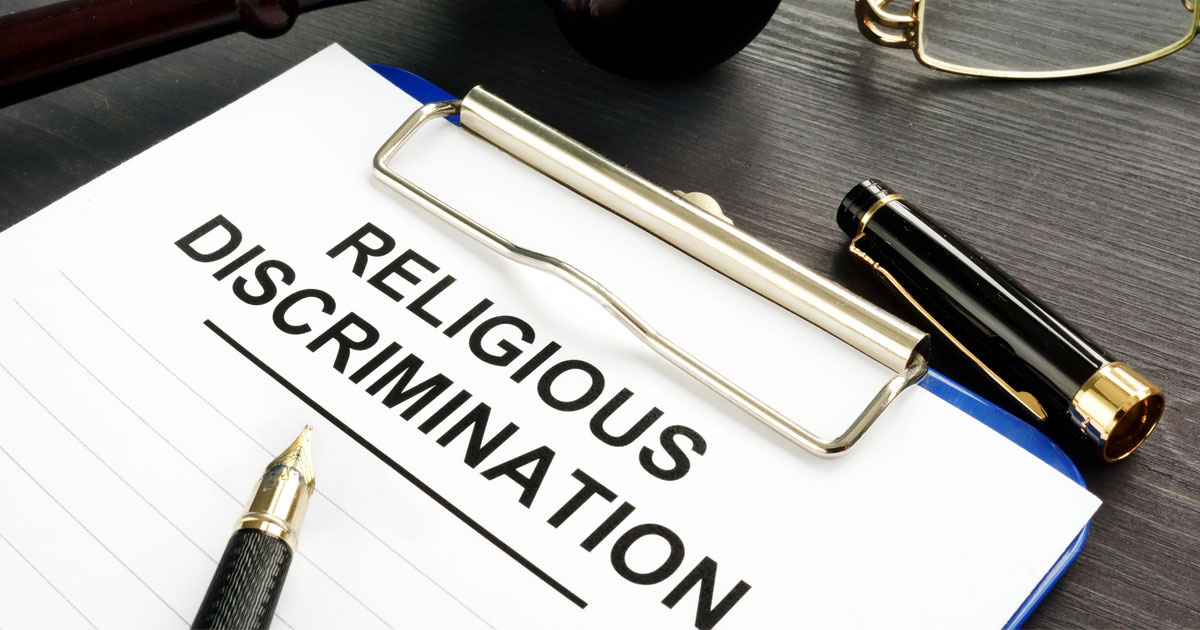In the modern workplace, diversity is celebrated as a strength that fosters innovation and creativity. However, despite progress in promoting inclusivity, religious discrimination remains a challenge for many employees.
Religious discrimination in the workplace is when a worker is treated differently because of their religion, religious beliefs, or practices, including discrimination because of their lack of a religious belief or practice. Those who experience religious discrimination may experience other types of illegal discrimination, such as:
- Race discrimination
- National origin discrimination
- Immigration or citizenship discrimination
Furthermore, there are many different types of religious discrimination in the workplace to be aware of, including:
- Decisions based on religious preference: This common type of discrimination can include refusing to hire an employee because of their religion or lack thereof, firing an employee because of their religious beliefs, promoting someone because they participate in religious practice, and more.
- Harassment based on religious preference: Religious harassment can manifest in various forms, such as offensive jokes, derogatory comments, or exclusionary behavior targeting an individual’s religious beliefs. This type of discrimination creates a hostile work environment, making it difficult for employees to perform their duties comfortably.
- Failing to accommodate religious preference: Employers must make reasonable accommodations for employees to practice their religious beliefs, provided these accommodations do not cause undue hardship to the business. Denying requests for time off for religious holidays or refusing to provide appropriate spaces for religious practices can constitute religious discrimination.
- Dress code and appearance policies: Some workplaces may have dress code policies that inadvertently discriminate against certain religious practices. For instance, if a company enforces a strict dress code that does not accommodate religious attire or grooming practices, it can hinder employees from freely expressing their beliefs.
- Stereotyping: Stereotyping occurs when individuals are unfairly categorized based on their religious affiliations. This can lead to preconceived notions about an employee’s abilities, work ethic, or trustworthiness. Stereotyping perpetuates bias and undermines the principles of fair and equal treatment in the workplace.
- Retaliation for religious expression: Employees may fear retaliation for expressing their religious beliefs in the workplace. If an employer or coworkers treat someone negatively or take adverse actions against them due to their religious practices or expressions, it constitutes discrimination and goes against the principles of workplace equality.
How to Prevent Religious Discrimination in the Workplace?
The Civil Rights Act of 1964 protects workers and job seekers from discrimination and harassment based on religion. The law also requires employers to reasonably accommodate a worker’s religious practices unless it creates an “undue hardship” on the employer.
To help a workplace prevent religious discrimination and foster an environment that respects religious diversity, employers and employees can:
- Implement inclusive policies: Employers should establish and communicate clear policies that promote inclusivity and prohibit discrimination based on religious beliefs. These policies should include provisions for reasonable accommodations and consequences for those who violate the anti-discrimination guidelines.
- Training and education: Regular training sessions on religious diversity and sensitivity can help raise awareness and educate employees about different beliefs and practices. This can contribute to a more understanding and tolerant workplace culture.
- Make it easier to report: Employers should provide a confidential and accessible channel for employees to report instances of religious discrimination. Creating an environment where employees feel safe to express their concerns is crucial for addressing and resolving issues promptly.
- Promote a culture of inclusion: Encouraging open dialogue and celebrating diversity through cultural events and awareness campaigns can contribute to a workplace culture that values and appreciates differences, including religious diversity.
Marlton Discrimination Lawyers at Burnham Douglass Advocate for Workers Facing Religious Discrimination
If you are facing religious discrimination, you need the best legal help to build a strong case. Our Marlton discrimination lawyers at Burnham Douglass are here for you. Call 856-751-5505 or fill out our online form for a free consultation. Located in Marlton and Northfield, New Jersey, we serve clients in South Jersey, including Evesham Township, Cherry Hill, Camden County, Burlington County, and Atlantic City.


